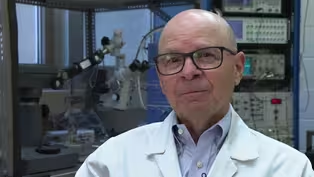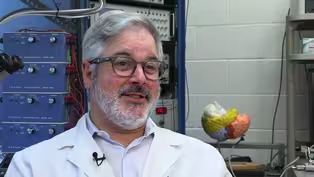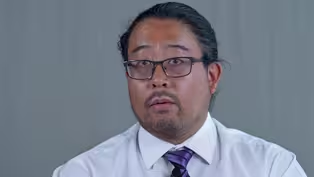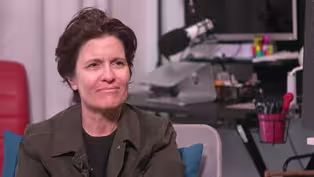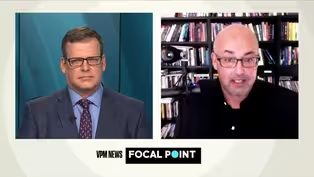VPM News Focal Point
Is technology overuse hijacking our children’s brains?
Clip: Season 2 Episode 17 | 3m 18sVideo has Closed Captions
A Chantilly, VA teacher says technology overuse is making kids less intelligent.
Recent studies show that excessive smartphone usage is bad for our physical and mental health. Phones are especially dangerous for young people - whose brains are still forming - causing distractions that impede their learning. Though many schools in Virginia have banned cell phones in class, teacher Joe Clement says the overuse of technology is making kids less intelligent.
Problems playing video? | Closed Captioning Feedback
Problems playing video? | Closed Captioning Feedback
VPM News Focal Point is a local public television program presented by VPM
The Estate of Mrs. Ann Lee Saunders Brown
VPM News Focal Point
Is technology overuse hijacking our children’s brains?
Clip: Season 2 Episode 17 | 3m 18sVideo has Closed Captions
Recent studies show that excessive smartphone usage is bad for our physical and mental health. Phones are especially dangerous for young people - whose brains are still forming - causing distractions that impede their learning. Though many schools in Virginia have banned cell phones in class, teacher Joe Clement says the overuse of technology is making kids less intelligent.
Problems playing video? | Closed Captioning Feedback
How to Watch VPM News Focal Point
VPM News Focal Point is available to stream on pbs.org and the free PBS App, available on iPhone, Apple TV, Android TV, Android smartphones, Amazon Fire TV, Amazon Fire Tablet, Roku, Samsung Smart TV, and Vizio.
Providing Support for PBS.org
Learn Moreabout PBS online sponsorshipJOE CLEMENT: When you give a cell phone to a young person, you're giving them infinite entertainment in their pocket and then you add this tool to them.
That can obviously be very powerful, but it's also a tremendous distraction.
That's a recipe for disaster in a classroom.
My name's Joe Clement, and I am a public school teacher.
I've been teaching high school for, this is my 30th year, and I have written a book with a co-teacher, named Matt Miles, and it's called “Screen Schooled.
” And the initial intent was to explain what we had discovered about why there was this decline in the ability of young people to solve problems, to think critically, to focus, to interact socially.
People talk about the idea of multitasking and students aren't multitasking.
What we've found over time is that what they're doing is what we call multi switching.
They have attention on the teacher, then they have attention on their phone, and then they have attention on the teacher, and they have attention on the phone.
There's no continuity, but also in things like our young people today work less.
They're involved in fewer extracurricular activities.
They're dating less than generations that come before.
And all of that is because the social media app on your phone is a substitute and it's a much lower risk connection than putting yourself out there in real life.
My wife, Molly, and I have three kids.
We have tried to be as low tech as possible.
We've decided that cell phones are not going to be part of their lives until they get to an age, you know, certainly into high school.
MOLLY CLEMENT: My daughter has a play date over here.
The kids know you're going to go and play on the creek path, and you're going to play on the playground, and you're going to get dirty, and we're going to bake, and you're going to color and play Barbies.
And that's what we do in our home.
ANNA CLEMENT: Some of my friends do use some phones, which I don't really like, because there really isn't anything to do on a phone.
It's just you're going to like look on YouTube and stuff.
And I don't really think that's important.
It doesn't have anything to do, I would rather like do something like be outside or like be doing something that doesn't involve being on a screen.
MOLLY CLEMENT: Oh, wow.
JOE CLEMENT: So, when it comes to parental expectations and what to expect in terms of cell phones in school, I would like to see a de-emphasis on the use of phones during the school day.
My main piece of advice, if you're going to get your kid a phone, is to not text them during the school day.
Not communicate with your kid during the school day.
And if you have any kind of monitoring device, monitor, look, they're on social media, they're on Netflix, they're on pornography, they're playing video games all day long.
The biggest thing that we have to think about that I think we don't, is opportunity cost.
What are kids not doing when they're on their phones?
And what we know, the 2022 Common Sense Media study says that teenagers are on their phones for over eight and a half hours a day, not at school.
And what else could they be doing for that eight and a half hours?
They could be taking a walk outside, they could be hanging out with their friends.
AI and olfactory-implant systems: Dr. Richard Costanzo, VCU
Video has Closed Captions
Clip: S2 Ep17 | 7m 33s | Dr. Richard Costanzo discusses deep brain stimulation research about the sense of smell. (7m 33s)
AI, implants & smell: Dr. Daniel Coelho, VCU Health
Video has Closed Captions
Clip: S2 Ep17 | 9m 2s | Dr. Daniel Coelho discusses deep brain stimulation research (9m 2s)
Artificial intelligence: What are the risks and benefits?
Video has Closed Captions
Clip: S2 Ep17 | 7m 46s | What does a future with artificial intelligence look like? We examine risks and benefits. (7m 46s)
Video has Closed Captions
Clip: S2 Ep17 | 2m 12s | Artificial intelligence is proving useful for medical breakthroughs (2m 12s)
Deep brain stimulation and disease: Dr. Paul Koch, VCU
Video has Closed Captions
Clip: S2 Ep17 | 10m 58s | Dr. Paul Koch discusses deep brain stimulation research and the treatment of disease. (10m 58s)
Epilepsy treatments: Dr. Kenichiro Ono, VCU Health
Video has Closed Captions
Clip: S2 Ep17 | 3m 17s | Neurologist Dr. Kenichiro Ono discusses deep brain stimulation and treating epilepsy. (3m 17s)
Tech journalist and podcast host Kara Swisher talks about AI
Video has Closed Captions
Clip: S2 Ep17 | 19m 7s | Tech journalist and podcast host Kara Swisher says AI "can be a weapon but it’s a tool." (19m 7s)
Technology Expert on the Biggest Threats to Democracy
Video has Closed Captions
Clip: S2 Ep17 | 13m 36s | Expert says AI, fake news and social media are not the biggest threats facing democracy. (13m 36s)
Virginia Is The World’s Data Center Hub - What’s The Cost?
Video has Closed Captions
Clip: S2 Ep17 | 4m 37s | Most of the world’s internet data flows through Virginia. What do more data centers mean? (4m 37s)
Providing Support for PBS.org
Learn Moreabout PBS online sponsorship
- News and Public Affairs

Top journalists deliver compelling original analysis of the hour's headlines.

- News and Public Affairs

FRONTLINE is investigative journalism that questions, explains and changes our world.












Support for PBS provided by:
VPM News Focal Point is a local public television program presented by VPM
The Estate of Mrs. Ann Lee Saunders Brown
